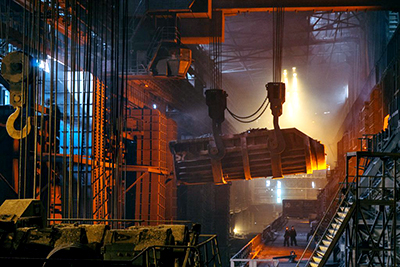Northquest finds new direction in technology and infrastructure funding
INNOVATIVE asset finance and infrastructure managed services group Northquest has found a way to any CFO’s heart, looking to fund critical infrastructure for sustainable business development.
Northquest has developed an innovative funding solution that offers a prime motivation for any decision maker: Projects deliver immediate economic or productivity dividend benefits.
This is no mean feat when much of the funding Northquest actions introduces new technologies for greater business efficiency, including renewable energy, energy efficiency and critical building and facility infrastructure. Northquest is already looking at backing robotics and automated logistics assets.
It is a big change from just a few years ago when these sustainability and energy efficiency-led transactions would never be approved – they were simply outside the payoff timeframes and prioritized capital allocations. 
Northquest has astutely turned that around by identifying – and meeting – three important criteria for decision makers. Now those transformative technology asset projects are more likely to proceed, than not, through Northquest in Australia.
“What we found over the past five years was that a lot of these transactions just weren’t seeing the light of day,” Northquest infrastructure and energy managing director, Rad Krvavac said. “There was a lot of interest from the client base, whether it was looking at addressing outgoings attached to energy, improving productivity through technology upgrades or sustainability initiatives. When the projects reached approval level there were generally three drivers to get these transactions off the ground that were not being met.”
The first was that any project had to have a positive economic benefit “from day one”.
“Ultimately a lot of these transactions have very long-dated payoffs – especially in energy,” Mr Krvavac said. “It is always difficult to invest in projects with payoffs greater than five years as there is always a better use of company capital.”
Northquest has solved this problem by offering new technology assets as managed services. Northquest owns the asset and provides its benefits as a managed service – so in the case of energy efficiency technologies such as LED lighting, a client company enjoys lower power costs immediately with no requirement for upfront capital. Savings can be projected for the period of the contract and beyond, and are greater than the managed service charge and have the added benefit of reducing the organisations carbon emissions.
The second barrier concerned the handling of the funding of the new infrastructure project on the company’s balance sheet. This has been brought on by a change in international accounting standards which modifies how leased assets are recorded on balance sheets. The third hurdle was the removal of the delivery and performance risk attached to the investment in new technology assets. CFOs were concerned they were moving into areas that were not core business and may prove difficult to manage.
What was required, Mr Krvavac realised, was a paradigm shift in structuring the funding and Northquest had the capital raising networks and the pedigree to make it work.
“The funding historically available in the market for these transactions was predominantly via the traditional banking sector,” Mr Krvavac said. “The funding from a client perspective was being viewed as dumb debt on their balance sheets while the appetite for longer dated funding was not available via the banking sector due to changes in capital adequacy requirements.
“We saw a big change in accounting standards happening behind the scenes in Australia from the new leasing standard AASB 16 [a change to how leases are accounted, part of the International Financial Reporting Standards agreements administered by the Australian Accounting Standards Board].
“All funding, such as operating leases etc, were going ‘on balance sheet’ in January 2019. That standard started having an impact last year with large organisations changing the way they fund projects due to this changed accounting standard. Suddenly all these transactions had to be ‘off balance sheet’ as a prerequisite for approval.”
The reason this IFRS-encouraged change will make a significant difference is that from 2019 all property and equipment leases previously recognised off-balance sheet will be accounted for as right-of-use (ROU) assets with associated lease liabilities. This is designed to bring more transparency about an organisation’s lease commitments and it changes financial metrics such as return-on-capital and EBITDA.
Northquest’s managed service model is an elegant solution that address the delivery of these projects and their impact under the changed accounting standards.
“The third issue we were finding was that when it came to energy efficiency or sustainability projects, they are generally not an integral part of your business,” Mr Krvavac said. “If you are in the business of healthcare or widgets then you do not necessarily want to take a position on a solar PV (project)”.
“So no-one wanted to take on the risk associated with the delivery of these initiatives. That is when we really started to look at bridging the gap … looking on these projects from not just a finance perspective but a client perspective.” 
Northquest began submitting innovative funding mechanisms that started addressing all three of these issues for potential clients.
“We differentiate from other funders in the market, with our managed service solutions that allow for the delivery of this critical infrastructure under a managed service contract. That allows us to address the immediate economic benefit, off-balance sheet structure and de-risking of delivery and performance risk, in favour of the client.”
TAKING THE INITIATIVE
Northquest’s name itself is a giveaway. This is a company that has quested onward and upward from its own ‘day one’ in 2007.
While it started out as a “fairly traditional asset finance company” according to Mr Krvavac, funding all types of assets, predominantly for the Top 200 ASX-listed companies. (needs rewording)
But Northquest’s founders – Matthew Macdougall, Bill Murfitt and Philip Barclay – knew they were on an epic journey to “remove the roadblocks businesses face when trying to secure the infrastructure and resources they need to grow and improve their businesses”.
Today, with more than 50 experienced staff drawn from some of the world’s most respected blue chip businesses, Northquest has found its astute business model and dependable approach attracts the financial support of some of the world’s largest pension funds and the Australian superannuation giants.
Northquest ‘cut its innovation teeth’ in the commercial application of emerging renewable and efficient energy technologies.
“In 2012 we started getting heavily involved in the renewable energy and energy efficiency sectors,” Mr Krvavac said. “One of our first transactions was a $50 million waste-to-energy plant in Victoria for a large national manufacturing company followed by investments in tri-generation and solar PV.”
This was the proving ground for the innovations that have followed for Northquest clients – where they realised that satisfying these three key requirements for CFOs was the trigger for success.
“Every CFO wants an economic benefit from day one. Not a deferred one,” Mr Krvavac said.
“What we have been able to do is to provide long dated funding. That’s (funding) greater than 10 years and it can be up to 30 years depending on the organisation. By embedding long-dated funding in a transaction that has a normal payoff in, say, 10 years, we can allow that transaction to be op-ex positive from day one.
“The client gets an economic benefit immediately. From a CFO perspective this becomes interesting as they are getting a positive cashflow impact on the delivery of a critical infrastructure project which they normally wouldn’t undertake due to the long term investment horizon.”
Structured under a NQ managed service agreement, Northquest owns the asset and is responsible for its performance over the contracted lifecycle. This works to ‘de-risk’ the delivery and the performance of the asset, from a client perspective,
“For example if we were looking at a single project like solar, our clients get cheaper power from the solar PV system than what they are currently paying from their retailer,” Mr Krvavac said. “No upfront capital, positive economic benefit from day one, and they have no risk from the performance of the solar PV over the 20-year period.
“That’s where we have been fairly innovative and we are, at the moment, a leader in having alternative solutions for certain infrastructure projects.”
Mr Krvavac said Northquest has so far engaged in specific industry segments, mainly in the education, health care and property sectors, along with multinational industrial sector clients.
“We also provide utility sector solutions across Australasia,” he said.
While Northquest has succeeded in renewable energy and energy efficiency projects, it has provided support for critical building infrastructure technologies such as heating, ventilation and air conditioning (HVAC) upgrades.
“What we find is there is a large pool of clients with ageing infrastructure in their facilities,” Mr Krvavac said. “There are a lot of assets that need upgrading and unfortunately they all require short-term payoffs, so it is very difficult for people to put their hands in their pockets to fund these types of transactions if they are not getting the economic benefit from day one.”
Northquest has a policy of only working with top-tier companies for the delivery of infrastructure and ongoing servicing.
“There is a greater alignment of interests with clients knowing that they have Tier 1 equipment with a lower asset lifecycle cost in their facilities that has a life longer than the service agreement. It removes the headline capital hurdle and puts a focus on lower asset life cycle costs and sustainable investment.
“We work closely with a lot of the major vendors within the markets, whether it’s energy based solutions, whether it’s electrical, mechanical or hydraulically based services within facilities. Ultimately, we are an enabler that unlocks these projects and gets them off the ground while allowing our clients to achieve their objectives.”
CAPITAL IDEAS
One of the ‘no-brainers’ for CFOs about Northquest’s funding solution is the fact that it covers 100 percent of the project cost with the ability to fund for the period of the asset life cycle. Traditional funding structures generally have a much higher inherent cost of capital due to a requirement for equity and project risk. Northquest solutions can be applied to both greenfield and brownfield projects.
“All of our major markets have issues around critical infrastructure and new technology adaption in their facilities,” Mr Krvavac said. “With rising energy prices in in Australia, there is a very large focus on trying to reduce the outgoings around operations using energy efficiency or installing equipment that drives some sort of productivity dividend from day one. 
“There are a lot of opportunities now for corporates to take ownership and address critical outgoings by looking at renewable energy, energy efficiency or new technologies such as automation.
“We are at the centre of a perfect storm now due to the convergence of technology efficiencies and increased energy costs where, with the right solution most projects are becoming viable,” Mr Krvavac said.
“Traditionally to get the projects off the ground, you need a capital allocation from the organisation and the appropriate short dated payoff. That’s where we come in to drive a positive economic outcome from day one, no upfront capital from the client, and all the risk of performance (covered by Northquest).”
NEW FRONTIERS
With the variety of technologies Northquest considers, the group seems poised to assist innovative new Australian technology companies gain a market foothold.
“There are a lot of new technology companies developing driving improved productivity for clients,” Mr Krvavac said. “These technologies are not just energy related, it can relate to anything.
“The problem a lot of these tech companies have is actually selling their technology into the market they are generally unproven and expensive by nature. We can enable the vendor and the end client to actually get that project off the ground. We would own that technology with no upfront capital to the client and we would structure it as a managed service contract.
“From a client perspective, they don’t have to put their hands in their pockets, they get the new technology, they get productivity dividends day one. Northquest is matchmaking, in a sense.”
Mr Krvavac said projects could be “quite bespoke as well”.
Northquest has looked at a project best described as “a robotic pharmacy” and another hi-tech automated logistics plant.
“Cutting edge tech can be introduced … and we see more and more of that going forward,” Mr Krvavac said.
Northquest anticipates introducing new Australian technologies, as solutions, to certain markets.
“We are more than happy to take a look at them,” Mr Krvavac said. “This funding model, if it suits a new technology, then those organisations will have a high success rate going forward as they have multiple options to get their product to the market particularly the removal of the headline capital cost and performance risk..
“A lot of start-up organisations try to use their own balance sheets to grow their business however they just do not have the scale to attract sufficient funding. Even if they do, it is often not scalable,” Mr Krvavac said. “Whereas, if these early-stage organisations have the appropriate clients, we can step in and remove that headline capital hurdle for both entities.”
Northquest, he said, had a good understanding of best-of-breed products. Historically, Northquest has tended to lean towards the bigger organisations as suppliers of technology assets and systems, including groups such as Johnson Controls, Schneider and Siemens.
“But with emerging technologies, we are becoming a conduit to enable a client to get that technology,” Mr Krvavac said.
“We actually have a solution for helping early stage best-of-breed tech companies in Australia to do business with the organisations that want and need those technologies. At Northquest, we find that very exciting.”
www.northquest.com.au
ends

 How to resolve AdBlock issue?
How to resolve AdBlock issue?